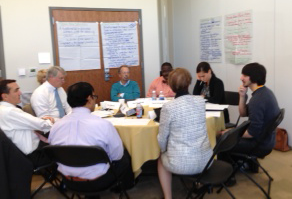The Guiding Principles established by the campus for UMBC’s strategic planning process call for a process rooted in reflection on UMBC’s mission, vision, values, and goals. The shared vocabulary developed to support the planning process defines “vision” as a statement of UMBC’s aspirations providing guidance for strategic planning.

VISION BACKGROUND
Consideration of UMBC’s current vision statement (below) has been a prominent part of early planning communications and dialogue.
UMBC seeks to become the best public research university of our size by combining the traditions of the liberal arts academy, the creative intensity of the research university, and the social responsibility of the public university.
- We will be known for integrating research, teaching and learning, and civic engagement so that each advances the others for the benefit of society.
- A spring 2013 Campus Planning Survey asked faculty, staff, and students: “How well does the current vision statement fit with your personal and professional goals?” Eighty percent of faculty and 76 percent of staff responded “excellent” or “good” fit. Among students, 71 percent of undergraduates and 79 percent of graduate students reported “excellent” or “good” fit.
- Nearly 200 faculty, staff, student, and alumni participants at the 2013 University Retreat this past August also discussed the role of vision, focusing on vision as a driver for moving the University from “Up and Coming” to “Best in Class.” Innovation, engagement, collaborations, and name recognition were identified as important drivers to reflect in a forward-looking vision statement.
- At its inaugural meeting August 21, the Strategic Planning Steering Committee identified several elements of the current vision statement that support our aspirations: “Combining the traditions of the liberal arts academy, the creative intensity of the research university, and the social responsibility of the public university.” However, the group also identified a number of additional concepts that should be included to inspire the campus to the next level of success. These included:
- Excellence
- Reflection of our unique culture
- Environmental responsibility
- A need to define our performance by quality rather than size
- At a Strategic Planning Leadership Retreat October 10, the Strategic Planning Steering Committee and the Council of Vice Presidents and Deans further explored vision elements. Among the highlights of this discussion:
- While accurately reflecting UMBC’s values, the current vision statement is too comfortable and conservative. An effective vision statement should be aspirational, provocative, and challenging.
- We should continue to strive to be a model for other public universities
- Diversity, inclusiveness, and excellence continue to be important vision elements.
- Creativity is so fundamental to UMBC that it should be a noun, not an adjective.
- Vision statement should make clear that we value all forms of knowledge and inquiry.
VISION LANGUAGE ELEMENTS
At its second meeting on October 15, the Strategic Planning Steering Committee discussed language elements that might be included in a revised vision statement. Participants in this meeting agreed that a vision statement should speak to what the campus has achieved and where we are going. Vision elements identified by participating committee members include:
- Integrating teaching, learning, research, and civic agency
- Traditions of the liberal arts academy, creative intensity of the research university, and social responsibility of the public university
- Bold, dynamic model of inclusive excellence
- Re-imagining teaching, learning, and research
- Re-imagining the role of the public research university
- Enduring commitment to diversity, inclusiveness, and social justice
- Drawing on all forms of intellectual inquiry
- Intensive creativity